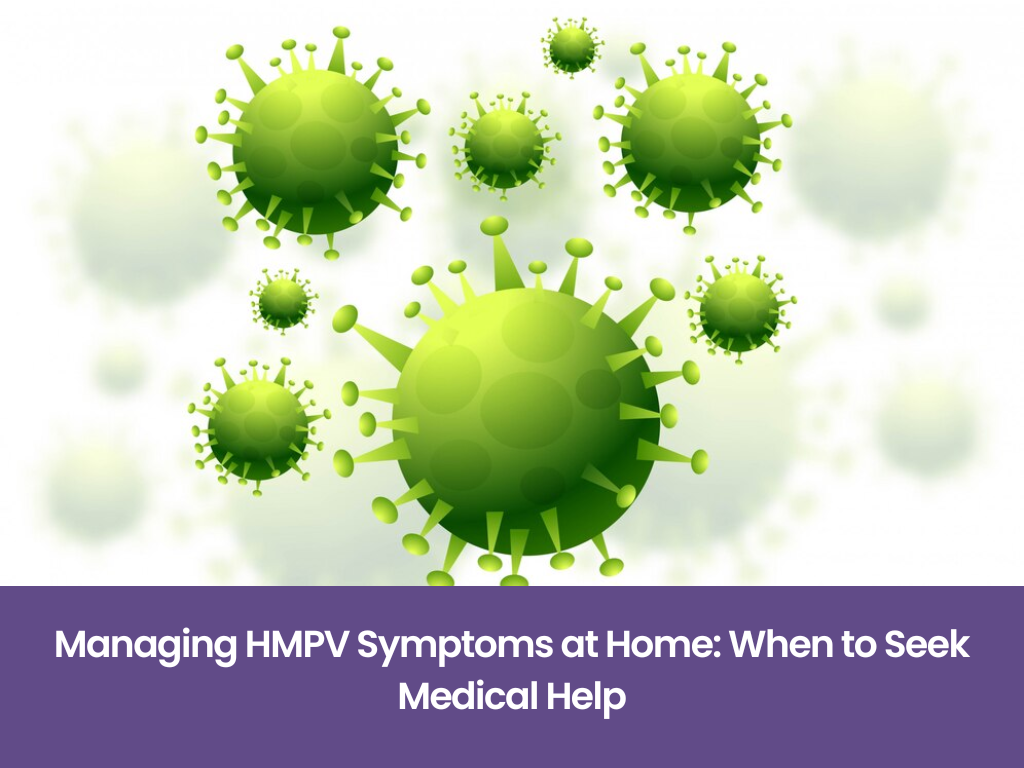Managing HMPV Symptoms at Home: When to Seek Medical Help
posted on Jan 16, 2025
Human Metapneumovirus (HMPV) is a respiratory virus that has been gaining attention due to its recent rise in cases, particularly among vulnerable populations such as young children, the elderly, and individuals with compromised immune systems.

Human Metapneumovirus (HMPV) is a respiratory virus that has been gaining attention due to its recent rise in cases, particularly among vulnerable populations such as young children, the elderly, and individuals with compromised immune systems. While many HMPV infections result in mild symptoms, the potential for severe respiratory distress necessitates awareness and preparedness. This article delves into understanding HMPV, managing its symptoms at home, and recognizing when medical intervention is critical.
What is HMPV?
Human Metapneumovirus (HMPV) belongs to the same family as Respiratory Syncytial Virus (RSV) and parainfluenza viruses. First identified in 2001, it primarily affects the respiratory tract and is a leading cause of upper and lower respiratory tract infections. Symptoms can range from mild cold-like manifestations to severe conditions like bronchiolitis and pneumonia.
The virus spreads through respiratory droplets, making it highly contagious in environments like schools, daycare centers, and nursing homes. Touching contaminated surfaces or direct contact with an infected person are common transmission methods.
Symptoms of HMPV
HMPV can present with symptoms that mimic the common cold or flu, which include:
In severe cases, symptoms may escalate to include:
Managing HMPV Symptoms at Home
For mild to moderate HMPV cases, home care can significantly alleviate discomfort and promote recovery. Here are some strategies for effective symptom management:
1. Ensure Adequate Rest
Encouraging rest is vital to aid the body’s immune response. Allow the affected individual to conserve energy, which is essential for recovery. For children, ensure they have a quiet and comfortable environment to rest.
2. Maintain Hydration
Dehydration can worsen symptoms, particularly in children and older adults. Offer plenty of fluids such as water, clear broths, or electrolyte solutions. For infants, breastfeeding or formula feeding should be continued unless otherwise advised by a pediatrician.
3. Use a Humidifier
Humidified air can help ease nasal congestion and soothe irritated airways. Place a clean humidifier in the patient’s room or encourage them to take warm showers to benefit from steam inhalation.
4. Over-the-Counter Remedies
-
Fever and Pain Relief: Administer medications like acetaminophen or ibuprofen to reduce fever and relieve discomfort. Follow the recommended dosage instructions carefully.
-
Cough Relief: For children over one year old, honey can be a natural remedy to soothe sore throats and suppress coughing. Avoid giving honey to infants under one year due to the risk of botulism.
5. Nutritious Diet
A balanced, nutrient-rich diet supports the immune system. Offer small, frequent meals if the patient’s appetite is reduced. Foods like soups, fruits, and yogurt can provide essential nutrients while being easy to consume.
6. Monitor Symptoms Closely
Keep a vigilant eye on symptoms to identify any worsening or the development of severe signs that may require medical attention. Tracking fever, respiratory rate, and hydration levels is particularly important.
When to Seek Medical Help
While most cases of HMPV resolve within one to two weeks, certain symptoms should prompt immediate medical evaluation:
1. Difficulty Breathing
Signs of respiratory distress, such as wheezing, rapid or shallow breathing, or labored breathing, require urgent care. These could indicate complications like bronchiolitis or pneumonia.
2. Persistent High Fever
A fever exceeding 102°F (39°C) or one that does not subside with treatment over three days should be addressed by a healthcare provider.
3. Dehydration
Look for signs such as dry mouth, sunken eyes, reduced urine output, or lethargy. In infants, fewer wet diapers than usual can indicate dehydration.
4. Severe Fatigue or Lethargy
If the patient exhibits extreme tiredness, confusion, or unresponsiveness, particularly in young children or the elderly, immediate medical attention is necessary.
5. Worsening Symptoms
If symptoms intensify after several days or new issues like chest pain or severe headaches arise, consult a doctor without delay.
High-Risk Groups for Severe HMPV
Certain individuals are at higher risk for severe HMPV complications:
-
Infants and Young Children: Their immature immune systems make them more vulnerable to severe respiratory infections.
-
Elderly Adults: Aging reduces immune system efficacy, increasing susceptibility to complications.
-
Immunocompromised Individuals: Those undergoing chemotherapy, living with chronic illnesses, or on immunosuppressive drugs are at greater risk.
Preventive Measures
Preventing the spread of HMPV is as important as managing symptoms. Follow these guidelines to reduce transmission:
-
Regular Handwashing: Wash hands frequently with soap and water for at least 20 seconds.
-
Avoid Close Contact: Limit exposure to infected individuals.
-
Disinfect Surfaces: Clean commonly touched surfaces, such as doorknobs, phones, and countertops, regularly.
-
Cough and Sneeze Etiquette: Cover coughs and sneezes with a tissue or the elbow crease.
-
Ventilation: Ensure proper airflow in indoor spaces.
Conclusion
Human Metapneumovirus is a respiratory virus that, while often mild, can lead to significant health challenges for certain populations. By understanding its symptoms, practicing effective home care, and recognizing when to seek medical help, families can navigate HMPV with confidence. BGS Vijnatham School, one of the best schools in Greater Noida West, emphasizes the importance of preventive measures and community awareness to limit outbreaks. Staying informed and prepared is key to ensuring the health and well-being of everyone in the community.